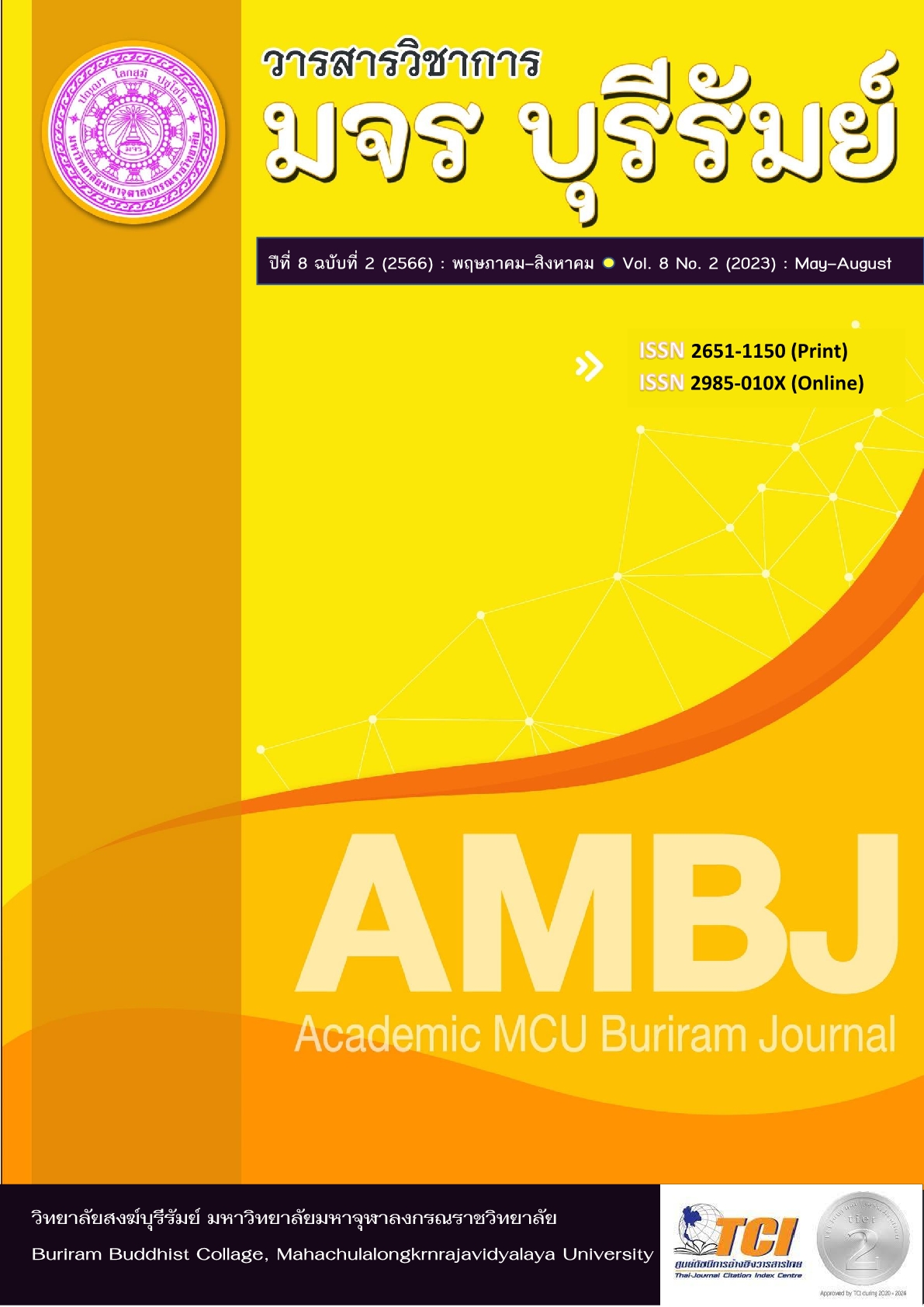The Development of Reading Comprehension Skills Using the KWL Plus Learning Process for Mathayomsuksa 2 Students at Wapi Pathum School
Keywords:
Reading Comprehension, Management Learning with the KWL Plus TechniqueAbstract
The purpose of this research were: 1) compare the reading comprehension skills of 2/6 students at Wapi Pathum School before and after learning management using the KWL Plus technique. 2) develop skills in reading comprehension skills of 2/6 students at Wapi Pathum School by learning management using the KWL Plus technique with the criteria of 80%. and 3) study the student's satisfaction with learning management with the KWL Plus technique.
The target group used in this research was 2/6 students of Wapi Pathum School. Province, Academic Year 2022, 40 people. Simple random sampling methods used in research are Learning plan for developing reading comprehension skills Using KWL Plus teaching techniques, 4 learning management plans, 2 hours each total 8 hours, 1 set of reading comprehension test, which is a multiple-choice test, 4 options, 30 questions. And satisfaction assessment form for 2/6 students at Wapi Pathum School There were 10 items on teaching and learning management using the KWL Plus technique. The statistics used in the research were mean (), standard deviation (S.D), and t-test.
The research results found that:
The results of Comparison of Reading Comprehension Skills of 2/6 Students at Wapi Pathum School The pre-and post-learning management using the KWL Plus technique was significantly higher than before at the 0.5 level. The reading comprehension skills by using the KWL Plus Technique were effective at 81.67, meeting the criteria of 80. And students in 2/6 students of Wapi Pathum School There was a good satisfaction with learning management with the KWL Plus learning process overall at the highest level ( = 4.61).
References
กระทรวงศึกษาธิการ. (2551). คู่มือจัดการเรียนรู้กลุ่มสาระการเรียนรู้ภาษาไทย. กรุงเทพฯ: องค์การรับส่งสินค้าและพัสดุภัณฑ์.
จิราภรณ์ บุญณรงค์. (2554). การเปรียบเทียบผลสัมฤทธิ์การอ่านจับใจความของนักเรียนชั้นประถมศึกษาปีที่ 6 ที่ได้รับการสอนด้วยเทคนิค KWL กับวิธีการสอนปกติ. วิทยานิพนธ์ปริญญาศึกษาศาสตรมหาบัณฑิต สาขาการสอนวิชาภาษาไทย. นครปฐม: บัณฑิตมหาวิทยาลัย มหาวิทยาลัยศิลปากร.
จินดารัตน์ ฉัตรสอน. (2560). การพัฒนาความสามารถในการอ่านจับใจความของนักเรียนระดับชั้นประถมศึกษาปีที่ 5 ที่จัดการเรียนรู้ด้วยเทคนิค KWL ร่วมกับแบบฝึก. วารสาร มจร สังคมศาสตร์ปริทรรศน์, 6(1), 141-151.
ภัทรนันท์ ศรอินทร์. (2560). การศึกษาความสามารถด้านการอ่านและการเขียนภาษาไทยของนักเรียนชั้นประถมศึกษาปีที่ 1 โดยการจัดการเรียนรู้แบบKWL-Plus. วิทยานิพนธ์ปริญญามหาบัณฑิต สาขาวิชาการบริหารการศึกษา. คณะศึกษาศาสตร์: มหาวิทยาลัยฟาร์อีสเทอร์น.
ไลวัลย์ สิงห์ซอม. (2555). การจัดการเรียนรู้โดยใช้เทคนิค KWL Plus เพื่อพัฒนาความสามารถในการอ่านจับใจความผลสัมฤทธิ์ทางการ เรียนภาษาไทยและความพึงพอใจต่อการจัดกิจกรรมการเรียนรู้ ชั้นประถมศึกษาปีที่ 6. วิทยานิพนธ์ครุศาสตรมหาบัณฑิต. เชียงราย: มหาวิทยาลัยราชภัฏเชียงราย.
วัชรา เล่าเรียนดี. (2547). เทคนิคการจัดการเรียนรู้สำหรับครูมืออาชีพ. นครปฐม: คณะศึกษาศาสตร์ มหาวิทยาลัยศิลปากร.
วันวิดา กิจเจา และอธิกมาส มากจุ้ย. (2558). การศึกษาผลสัมฤทธิ์การอ่านจับใจความสำคัญของนักเรียนชั้นมัธยมศึกษาปีที่ 1 ที่จัดการเรียนรู้โดยการเรียนแบบร่วมมือเทคนิค STADร่วมกับ เทคนิค KWL Plus. วารสารสาขามนุษยศาสตร์สังคมศาสตร์และศิลปะ, 8(2), 1040.
แววมยุรา เหมือนนิล. (2556). การอ่านจับใจความ. พิมพ์ครั้งที่ 4. กรุงเทพ ฯ: สุวีริยาสาสน์.
Downloads
Published
How to Cite
Issue
Section
License
Copyright (c) 2023 Academic MCU Buriram Journal

This work is licensed under a Creative Commons Attribution-NonCommercial-NoDerivatives 4.0 International License.
ทัศนะและความคิดเห็นที่ปรากฏในบทความวารสารฉบับนี้ถือเป็นความรับผิดชอบของผู้เขียนบทความนั้น ไม่ถือเป็นทัศนะและความรับผิดชอบของบรรณาธิการ





